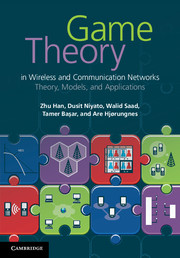Preface
Published online by Cambridge University Press: 25 October 2011
Summary
With the recent advances in telecommunications technologies, wireless networking has become ubiquitous because of the great demand created by pervasive mobile applications. The convergence of computing, communications, and media will allow users to communicate with each other and access any content at any time and at any place. Future wireless networks are envisioned to support various services such as high-speed access, telecommuting, interactive media, video conferencing, real-time Internet games, e-business ecosystems, smart homes, automated highways, and disaster relief. Yet many technical challenges remain to be addressed in order to make this wireless vision a reality. A critical issue is devising distributed and dynamic algorithms for ensuring a robust network operation in time-varying and heterogeneous environments. Therefore, in order to support tomorrow's wireless services, it is essential to develop efficient mechanisms that provide an optimal cost-resource-performance tradeoff and that constitute the basis for next-generation ubiquitous and autonomic wireless networks.
Game theory is a formal framework with a set of mathematical tools to study the complex interactions among interdependent rational players. For more than half a century, game theory has led to revolutionary changes in economics, and it has found a number of important applications in politics, sociology, psychology, communication, control, computing, and transportation, to list only a few. During the past decade, there has been a surge in research activities that employ game theory to model and analyze modern communication systems.
- Type
- Chapter
- Information
- Game Theory in Wireless and Communication NetworksTheory, Models, and Applications, pp. xv - xviiiPublisher: Cambridge University PressPrint publication year: 2011



